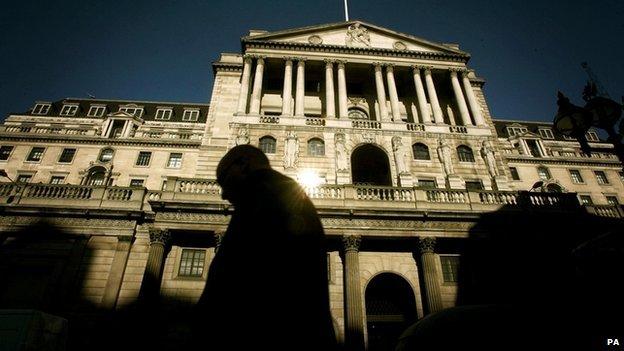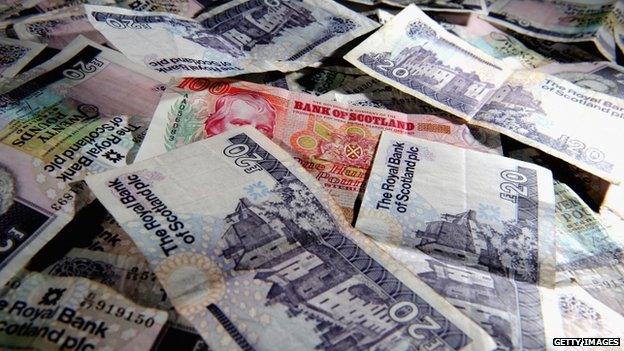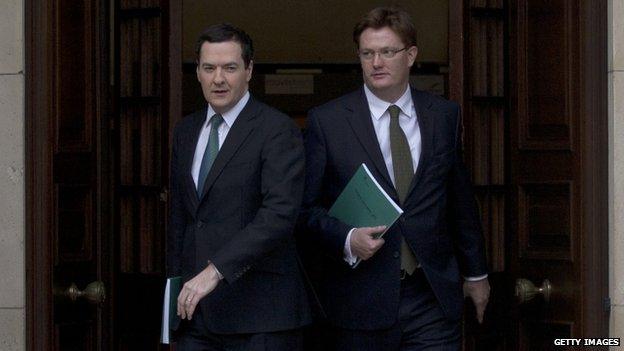Scottish independence: Currency crunch
- Published
Experts give their view on whether Scots would be better off in an independent Scotland
Today, we have reached a crunch point in the debate on independence. The seemingly unstoppable force of nationalism meets the immovable object representing the interests of the rest of the UK.
The Treasury has published a civil service study of currency options for an independent Scotland.
Chancellor George Osborne said one option he's not going to accept is a deal on sharing control of the pound sterling with Holyrood.
And so did Danny Alexander for the Liberal Democrats.
For Labour, Ed Balls is expected to give that stance his party's backing, should it find itself in power at Westminster after the May 2015 election.
There is, incidentally, an interesting question on those two: if there's a "Yes" vote, would Scottish Labour meekly accept the veto from a Labour Chancellor in 11 Downing Street, or take the view of Alistair Darling and others that, however much they want to retain the union, an independent Scotland would want to retain sterling?
Likewise, if there's a "Yes" vote, would Danny Alexander represent the interests of the rest of the UK from his office in the Treasury, or those of his Highland constituents?
Serious about sovereignty

The case we have heard from the parties that dominate Westminster is that they don't see it as being in the interests of the rest of the UK (rUK) to have dual controls of the Bank of England, or to share the risk of currency or banking crises.
They would require constraints on Scotland's budget, and they can anticipate having constraints placed on Westminster's.
If Scotland votes for independence, it's not clear why the rUK should surrender its own autonomy to this new neighbouring state - least of all with the biggest party smarting at the loss of sovereignty to institutions in Brussels. At Westminster, they take their sovereignty very seriously.
The SNP makes the case that a shared currency would be the common sense solution that ensures stability, easing continued trade between highly integrated economies.
They point to £60bn of goods and services sold into Scotland from the rUK. (But there's one of many asymmetries there; Scotland is one-seventh of the rUK's external market, whereas the rUK is two-thirds of Scotland's.)
The Scottish government case is that a stability agreement need go no further than the cap on debt and deficit - as ought to apply in the eurozone, but hasn't, disastrously.
It says Holyrood would still have the autonomy to pull those economic levers beloved of Alex Salmond and John Swinney. Why, it asks, would there be any need to meddle in each other's taxation systems too?
As so often, the economic argument is balanced. It's a judgement of whether pros outweigh cons.
That judgement from George Osborne may also be a gamble that Scotland will have to use the pound sterling anyway, or tightly peg its own currency to the rUK pound, meaning rUK businesses get all the benefits of a shared currency with few, if any, of the costs.
Currency kybosh

But of course, this is political too. And to kybosh any chance of a deal on currency is to deal a blow - seen even by some nationalists as being potentially fatal - to the credibility of the SNP government's economic strategy.
With no deal on the pound, it injects a big dose of uncertainty into voters' minds. This is on an issue which may be complex and technical, but which matters to everyone in the form of pay, savings, loans and pensions.
It's unlikely to reduce that uncertainty for one side to be saying "no deal", and the other saying "we don't believe you".
The SNP claims "no" is merely a short-term tactic, and that there is no need to prepare an alternative currency plan because, as I've been told, "common sense will kick in".
It can claim this contravenes the so-called Edinburgh Agreement, in which both sides agreed to respect the result of the referendum and to negotiate constructively and with mutual respect, "in the best interests of the people of Scotland and of the rest of the United Kingdom".
What the agreement doesn't say is what happens when the interests of Scots clash with those of the people of the rUK.
Dues denied

The dominant parties at Westminster sought to avoid any pre-negotiation, both because it could play into the SNP's hands and remove uncertainties, but also there was a fear that articulating the distinctive interests of the rUK might antagonise Scots.
But now they've broken their own rule. We now have one, very important piece of pre-negotiation, by declaring no negotiation at all.
It risks a backlash in the referendum, if the SNP can successfully lodge in voters' minds the interpretation that Scots are being "bullied", their dues denied, with Westminster laying down the rules what they're not allowed to do.
That's a risk. But this crunch point also demonstrates the rUK can choose to assert its interests. Its politicians will see it as their duty to fight for them.